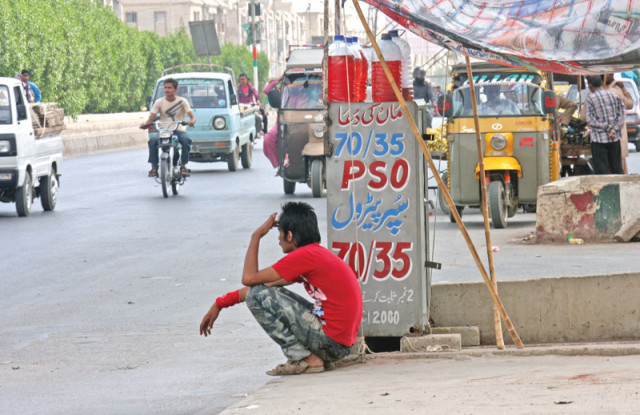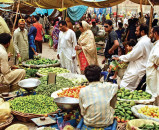Black gold: The contraband that runs Karachi’s wheels
Smuggled Iranian petroleum products sell freely in almost every locality of the city.

If you chance to venture into the more congested parts of the city, you may come across several roadside stalls, selling petrol and diesel in plastic bottles and small tin containers. This fuel has been smuggled from Iran via Balochistan.
Officially, the sale and purchase of these petroleum products is banned in Pakistan. The ban, however, has made it even more coveted for the thousands involved in its smuggling, for whom the contraband provides a lucrative income at minimal risk.

Roadside stalls selling Iranian petroleum products set up in North Karachi. PHOTOS: ATHAR KHAN/ EXPRESS
Dealers claim they pay heavy bribes to the police, Pakistan Customs, Pakistan Coast Guards and other agencies to keep their business alive. These agencies have come under fire on several occasions by government officials and members of civil society for their complicity in the illicit trade. The deadly accident of a passenger bus near Hub Chowki, carrying containers of the contraband, which had claimed over 40 lives, had raised much hue and cry among the civil society.
The police jumped into action; the Customs officials struck a few smugglers’ dens and the coastguards claimed to have detained several men trying to smuggle the contraband. A few months later, the noise died down and business resumed as usual.

Roadside stalls selling Iranian petroleum products set up in New Karachi. PHOTOS: ATHAR KHAN/ EXPRESS
In Karachi, the contraband is sold at small roadside stalls or makeshift outlets in the densely-populated areas where there is a huge demand for the cheaper fuel.
Sale and purchase in Karachi
Some roadside vendors mix the fuel with that purchased from the Pakistan State Oil pumps and sell it for around Rs2 above the market rate. Others sell purely Iranian fuel at lower rates. These pumps are located at a fair distance from each other and it is convenient for motorists to fill the fuel at these pumps rather than travel long distances.
“I charge Rs2 extra for providing the facility closer to the area [where there are no pumps nearby]. Motorists can save the money they would otherwise have to spend to get to the nearest petrol pump,” said one roadside vendor.

Roadside stalls selling Iranian petroleum products set up in Surjani Town. PHOTOS: ATHAR KHAN/ EXPRESS
Some of these vendors, particularly in Manghopir, Surjani, Orangi Town, SITE, Lyari and Ibrahim Hyderi have installed standardised dispensers at the stations.
The popularity of Iranian petroleum products can be gauged from the fact that Tara Chand Road in Keamari boasts more than five road vendors, besides dozens of stalls selling the contraband. Each one of these enterprises pays a bribe to the area police.
A survey shows that hundreds of people are involved in the business in the city. “The death of 40 people has snatched the bread from the mouths of hundreds of people associated with the business,” said Imran Khan, who was a wholesaler of Iranian fuel before the Hub accident. “Business has resumed but the profit margins are less as you must pay more to keep the police and others silent.”

While Iranian products are harmful for engines, their main advantage is the low rates. Depending on the area, pure Iranian petrol and diesel is between Rs20 to Rs40 cheaper than the standard petrol and diesel. “I do not know about the quality and the purity of the Iranian petrol but I do know that if the city shuts down or the petrol pumps go on strike, these road vendors run our vehicles,” said Kashif Naeem, a resident of Orangi Town.
Transporters’ profits
For the transporters, however, the contraband has provided a much-needed break.
The owner of a logistics company, Khaled Niazi, complained that they had been forced to use Iranian diesel in their trucks to make ends meet. The rates for hiring goods carriers vary each day, depending on the demand. “On Saturday, for example, a truck carrying 30 tons from Karachi to Lahore costs between Rs128,000 to Rs130,000.”

On average, a truck carrying this weight consumes around 750 to 800 litres of diesel from Karachi to Lahore. At Rs112 per litre for standard fuel, the cost of fuel alone would come to Rs89,600. Other costs including toll taxes, tyre punctures, food for the drivers, salaries and bribes for the police come to around Rs35,000 per trip. The total cost of a trip for the truck from Karachi to Lahore would come to around Rs124,600. This gives a profit of only around Rs4,000 to Rs6,000 per trip. At Rs90 per litre, the Iranian diesel provides a suitable alternative for these truck owners. According to Niazi, the only way to stop the truck owners from using the Iranian diesel is for the government to fix the rates of hire and alter the rates with the fuel prices.
Route
The goods carriers that transport cargo to Balochistan and even Iran bring back the fuel drums on the way back to Karachi. They use alternative routes to avoid the main check posts but largely travel along the Coastal highway, RCD highway, Quetta Seryab Road and Lasbella Road, reaching Karachi’s precincts at the Hub Chowki.

From Hub Chowki, they leave the conventional route, turning towards the Hub Bridge from where they head towards the Hub River. The largely unpaved roads at this site stretch for about one mile and connect to Mochko, Manghopir and Surjani.
Thus the vehicles enter the city through these katcha roads, and empty the contraband into underground storage tanks at Surjani and Manghopir. From these storage tanks, the fuel is supplied throughout the city in small vans and tankers.
Business is good
On average, approximately one million litres of Iranian fuel is smuggled into Karachi each month. A large share of the profits goes to the Customs, police and political parties, depending on their area of influence. The police, in each area, record the number of tankers and vans transporting the contraband and then charge the dealers accordingly. “Until and unless, there is demand for the cheap Iranian fuel, no one can stop it from being smuggled into the city,” an officer of the Pakistan Coast Guards told The Express Tribune.

Pakistan Customs is re-launching surveys of illegal petrol pumps operating in Karachi. “The aim of the survey is to gauge the quantity of the contraband being sold in the city,” the Pakistan Customs spokesperson told The Express Tribune. “The question is how are they able to smuggle the contraband to Karachi and sell it here,” he said. The official cited the example of a time when the Customs officials had stopped an entourage of trucks carrying the contraband near the Hub Chowki. The personnel of a security agency had intervened and ordered the officials to let them go.
“From the police constable to the ministers, all are involved in this illegal business,” remarked the Pakistan Petroleum Dealers Association chairperson Sami Khan. “I have been struggling against this menace since the last 10 years but have not been able to convince the authorities to implement the embargo properly.”
The police have the main responsibility to stop the illegal business that has mushroomed over last decade or so. “The lower ranking policemen are directly involved in the business,” explained a senior police official, requesting anonymity. Even the higher ranking officials are involved, but their connection is indirect.”
Published in The Express Tribune, October 9th, 2014.



















COMMENTS
Comments are moderated and generally will be posted if they are on-topic and not abusive.
For more information, please see our Comments FAQ